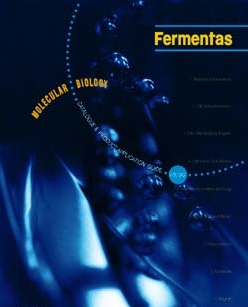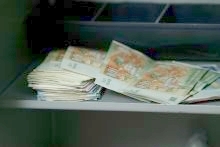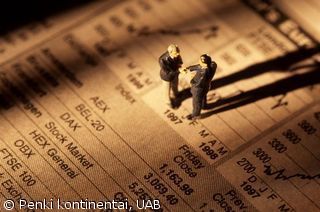For several years the position of Polish exporters on the markets of the former Commonwealth of Independent States has been clearly weakening
Published:
5 May 2003 y., Monday
In order to spur on trade, presentations of Polish exporters are gaining popularity. One such presentation is the Polish National Exhibition in St. Petersburg.
Geographic proximity, relatively small competition from local manufacturers who are not capable of satisfying the growing demand for modern products and, contrary to common belief, the increasingly wealthy and demanding customer, are the advantages of the "eastern market." Why then does trade with the countries of the Commonwealth of Independent States (CIS) constitute as little as 7.1 percent of the global value of Polish export?
The position of Polish companies is weakened by competition from the Western businesses that are perfectly aware of the perspectives which an active and strategically planned entry into Eastern markets can accomplish. Entrepreneurs from Germany, France and the United States, supported by the appropriate funds, first promote and then successfully sell their products in Russia and Ukraine or make direct investments there.
The decrease in the amount of Polish agriculture and food products exported to Eastern markets has stemmed from the fact that big international concerns such as Nestlé, Danone or Unilever directly entered this strategic area. However, the issue of Western competition is only a part of the answer to this question and the possibility of development for Polish exporters on the markets in the former Soviet Union.
One of the most serious difficulties Polish companies encounter is a considerable risk connected with signing commercial contacts with partners from the East who frequently appear to be insolvent and do not honor their contracts. According to Robert Stawski from the Promotion Chamber of the Polish Chamber of Commerce, businesspeople from Russia frequently do not understand the term "advance payment" and sometimes want to pay for the products only after they sell them. For obvious reasons, these terms are hard to accept for Polish manufacturers, which are mostly small and medium-sized companies. The state does not guarantee any protection for companies against situations in which partners from Russia, Belarus or Ukraine do not fulfill the terms of a commercial contract.
Šaltinis:
warsawvoice.pl
Copying, publishing, announcing any information from the News.lt portal without written permission of News.lt editorial office is prohibited.
The most popular articles
 Elinor Ostrom -- an American professor who developed ways to manage common property - is the first woman to win the Nobel prize for economics.
more »
Elinor Ostrom -- an American professor who developed ways to manage common property - is the first woman to win the Nobel prize for economics.
more »
 The European Commission has today approved an application from the Netherlands under the Globalisation Adjustment Fund (EGF) for € 386 114 to help 435 workers made redundant by Heijmans N.V., a Dutch construction company, back into jobs.
more »
The European Commission has today approved an application from the Netherlands under the Globalisation Adjustment Fund (EGF) for € 386 114 to help 435 workers made redundant by Heijmans N.V., a Dutch construction company, back into jobs.
more »
 Seeking to strengthen and further expand product sales in the Asian region, the Lithuanian biotechnology company Fermentas established its subsidiary in China.
more »
Seeking to strengthen and further expand product sales in the Asian region, the Lithuanian biotechnology company Fermentas established its subsidiary in China.
more »
 Statistics Lithuania reports that, based on non-final data obtained from customs declarations and Intrastat reporting data, exports in January–August 2009 totalled LTL 25.6 billion, while imports – LTL 28.9 billion.
more »
Statistics Lithuania reports that, based on non-final data obtained from customs declarations and Intrastat reporting data, exports in January–August 2009 totalled LTL 25.6 billion, while imports – LTL 28.9 billion.
more »
 On 6 October 2009 AB Bank SNORAS Board decided to reform the Private Limited Company UAB “SNORO investicijų valdymas” into the Public Limited Company AB „Finasta Holding“, which will control recently obtained „Finasta“ group companies and other Bank SNORAS group companies, engaging in investment management.
more »
On 6 October 2009 AB Bank SNORAS Board decided to reform the Private Limited Company UAB “SNORO investicijų valdymas” into the Public Limited Company AB „Finasta Holding“, which will control recently obtained „Finasta“ group companies and other Bank SNORAS group companies, engaging in investment management.
more »
 If your airline goes bankrupt and leaves you stranded what are your legal rights? Members of the Parliament's Transport Committee want grounded passengers to have access to a special compensation fund.
more »
If your airline goes bankrupt and leaves you stranded what are your legal rights? Members of the Parliament's Transport Committee want grounded passengers to have access to a special compensation fund.
more »
 Euro report says currency provided protection from interest and exchange rate turbulence.
more »
Euro report says currency provided protection from interest and exchange rate turbulence.
more »
 Statistics Lithuania informs that in September 2009, against August, prices for total industrial production sold dropped by 1.6 per cent.
more »
Statistics Lithuania informs that in September 2009, against August, prices for total industrial production sold dropped by 1.6 per cent.
more »
 The European Bank for Development and Reconstruction (EBRD), the European Investment Bank (EIB) Group, and the World Bank Group* on Monday warned against complacency in the face of significant challenges that stand in the way of economic recovery in Central and Eastern Europe.
more »
The European Bank for Development and Reconstruction (EBRD), the European Investment Bank (EIB) Group, and the World Bank Group* on Monday warned against complacency in the face of significant challenges that stand in the way of economic recovery in Central and Eastern Europe.
more »
 The leader of the country’s investment products’ market – AB DnB NORD Bankas – intends to issue up to EUR 300 million nominal value corporate notes in local and foreign markets over the next 12 months.
more »
The leader of the country’s investment products’ market – AB DnB NORD Bankas – intends to issue up to EUR 300 million nominal value corporate notes in local and foreign markets over the next 12 months.
more »